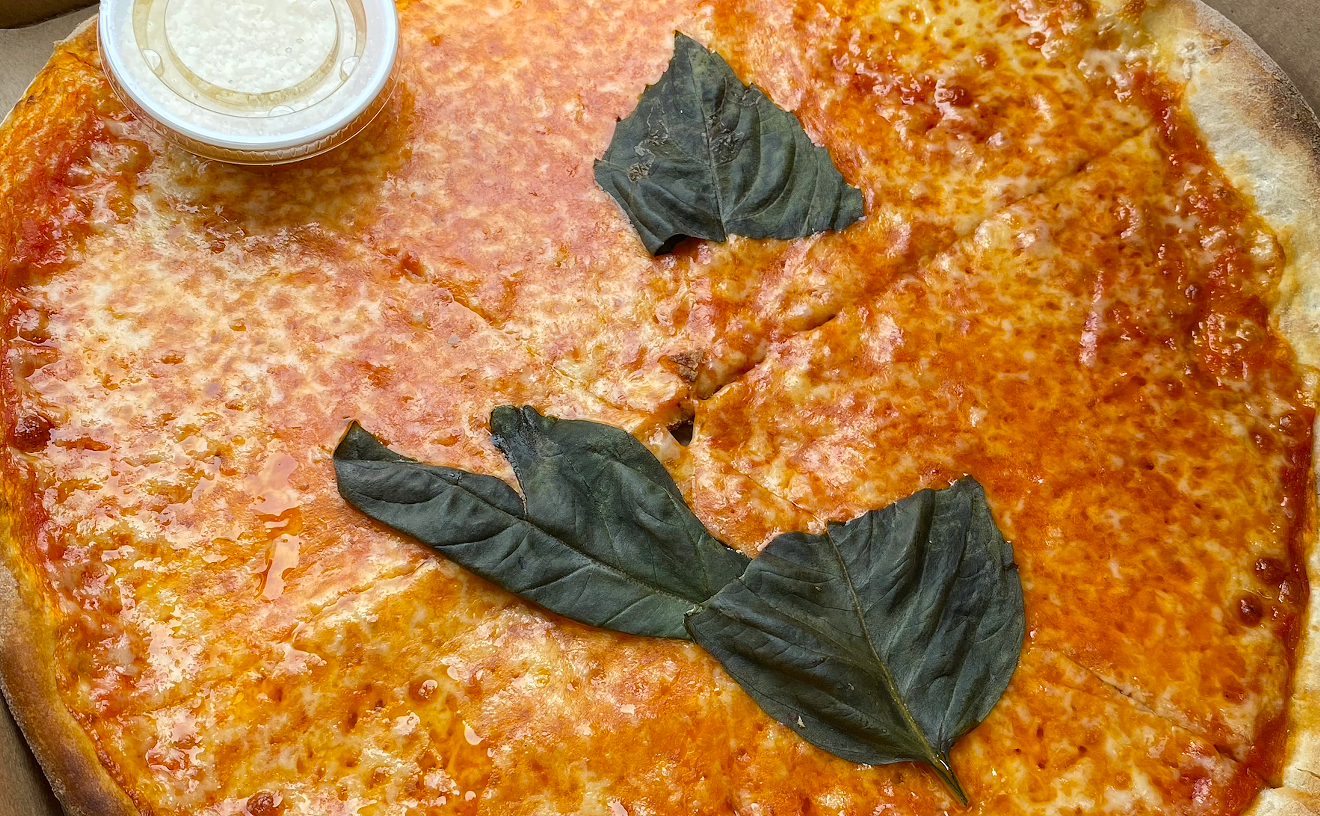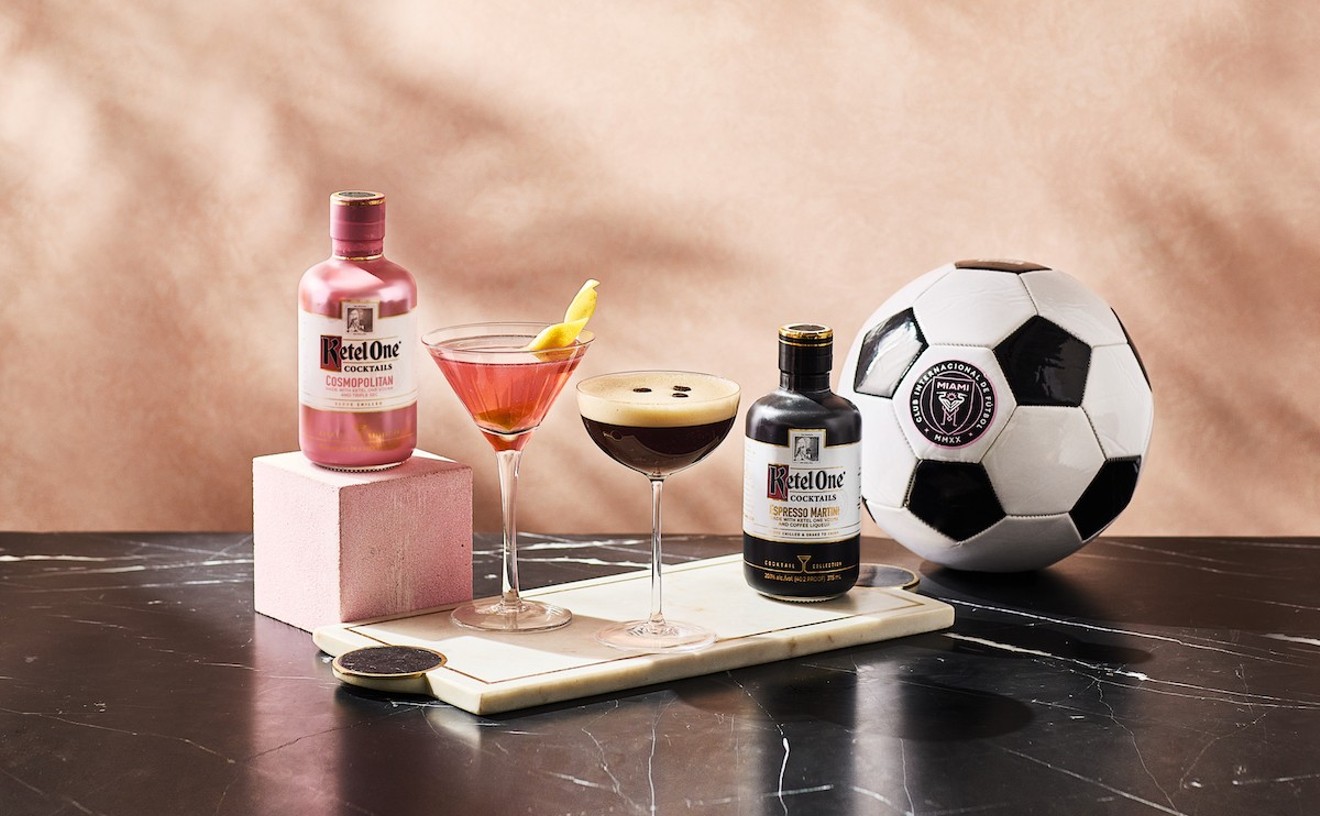In my graduate-school days, we used to say that such juxtapositions — eating foie gras while mulling over starvation diets — was a recipe for "cognitive dissonance." But any plate of foie gras these days is bound to create mental, spiritual, and gastronomic frissons that can't easily be reconciled. At La Cigale (which I'll review fully next week), Moroccan-born chef Farid Oualidi slices the duck's liver into two half-inch-thick ovals, sears them quickly in a very hot pan until they develop a bittersweet, caramel-flavored crust, and sets them gently on a toasted, buttered slice of brioche. Then he ladles on a few spoonfuls of cassis reduction and adds a handful of fresh raspberries. When your waiter carries this sumptuous treat to the table, along with the glass of Muscat you've asked for, he'll set it down with a proud and amused expression: He knows you're going to take one bite and melt faster than a glob of duck fat on a red-hot skillet.
This $18 appetizer is the most popular and sought-after delicacy at La Cigale, winning kudos for Oualidi and dollars for the coffers. The same is true for other local restaurants that serve foie gras: L'Escalier, Bice, Café Boulud, Café l'Europe, and Chez Jean-Pierre in Palm Beach; and Le Bistro and Café Maxx in Fort Lauderdale, among others. And that's just the problem. Foie gras, my friends, is a huge headache — for celebrity chefs, for duck farmers, for city councilpersons, for animal rights activists, for restaurateurs, for Arnold Schwarzenegger, for you and me. And you can bet it's one big bellyache too for the 250,000 ducks processed every year at Hudson Valley Foie Gras, the New York company that produces about 60 percent — around 220 tons — of all the foie gras eaten in the United States, including what's on my plate at La Cigale.
There is only one, rather unfortunate, method for producing this luxury item; the polite term is "gavage," and it involves pumping pounds of corn mush into the gullets of Moulard ducks three times a day for several weeks, until their livers swell to the size of a large man's fist, up to ten times their normal circumference (the fattened liver literally protrudes from beneath the animal's belly). It's a practice about as awful as many of the things we do to animals to make them taste good or to economize; the difference is that you can stop nailing a chicken's feet to its cage and still make a succulent bird, you can give a pregnant pig sufficient room to turn in her pen, but you can't produce foie gras without gavage. Let your ducks range freely, build them a nice little pond to cavort in, but at the end of the day, you're still going to have to force-feed them, just like slaves and farmers did in ancient Egypt and Rome. After two weeks of this, the duck's liver is 80 percent delicious fat, which accounts for the gastronomic high you get from eating it, the way it seems to melt away to nothing but an intensely pleasurable memory on your tongue, the very flavor of yearning. You can't eat foie gras without admitting that it's one of the world's supremely beautiful foods (embattled Caspian caviar, dark chocolate, and the increasingly rare and expensive truffle being others). And you shouldn't eat it either without silently giving thanks to the miserable fowl that produced it.
Had any foie gras lately? If you snooze, you're gonna lose.
A couple of years ago, in the middle of the night, a 26-year-old PhD student named Sarahjane Blum led a group of animal-rights activists onto the property at Hudson Valley Foie Gras to "liberate" some of the ducks being held prisoner there. Blum, who runs the website GourmetCruelty.com, managed to get out with a half-dozen of the worst cases, ducks purportedly bleeding from open wounds, too bloated to walk, some being nibbled on by rats. Blum and other animal libbers who run sites like stopforcefeeding.com, stopgavage.com, and nofoiegras.com have been called "idiots" by superchefs like Chicago's Charlie Trotter, even as he removed foie gras from his own menus last year. She's been called much worse by those who lump her with radical groups like Animal Liberation Front. ALF took credit for destroying Sonoma Saveurs in 2003, a California foie gras restaurant owned by Guillermo and Junny Gonzalez, who also run the only other foie gras farm in the United States. ALF apparently secretly videotaped and threatened chef and Saveurs co-owner Laurent Manrique and his family at their home too. But Blum doesn't look or sound a bit dangerous. She's brave and passionate and full of heart. And when she speaks or shows the video footage she surreptitiously took at U.S. foie-gras farms, our politicians sit up and listen.
Blum is one reason there are bills pending around the country to ban the production, sale, and, in one case — unbelievably — the "possession" of foie gras. The bills specifically target foie gras produced by the 3,000-year-old method of gavage — but let's be clear, there's no other kind of foie gras, and it doesn't look likely that there ever will be. Such a bill has passed in California, where it won't take effect (on the state's lone producer) until 2012. But laws are currently being debated in New York, Massachusetts, Washington, Oregon, Hawaii, and Illinois, along with a city bill in Chicago that would ban the sale of foie gras in all restaurants. To put this in perspective, such laws will mean that the country's greatest chefs, geniuses like Thomas Keller of the French Laundry and Per Se (who serves it with apple purée, brioche, and cipollini onions) or Wylie Dufresne of WD-50 (whose version includes anchovies and cocoa powder) or Daniel Boulud or Eric Ripert or dozens and dozens of U.S. chefs acclaimed throughout the world, would be legally prohibited from using an ingredient that has informed and transformed their art for decades. It's a bit like telling Picasso that blue paint is now illegal. But sure, he can still make pictures. The war is on. As yet, the battle is only beginning to heat up in Florida, where Johnny Vinczencz has removed foie gras from his menu at Johnny V on Las Olas, as has Miami chef Giancarla Bodoni at Escopazzo, whose foie gras was a runaway favorite with diners. And according to Len Falls at the Animal Rights Foundation of Florida, so has, "unofficially," George Telles at Lauderdale's upscale Black Orchid Café (a restaurant known for its exotic meats like ostrich, venison, and buffalo), although I couldn't reach Telles to confirm this. Falls admits that ARFF's campaign against foie gras — which mostly involves trying to persuade local chefs not to serve it — is strategic. "I think we focused on foie gras as a practical matter," he says. "It's a place we can make an impact, because it's served in high-end restaurants, and it's a very fancy appetizer. I'd agree that the suffering of animals on egg farms is a much bigger problem — there are millions and millions of chickens in Florida. And we're not planning to push for foie gras legislation in Florida yet — we have other issues we're concentrating on."
This war, let's be frank, is a class war and a culture war too. The French, after all, are mostly responsible for America's budding love affair with foie gras. The stuff is eaten mostly by the rich (although any middle-class schlub can forego a couple of MacMeals and go for the foie instead, as plenty of French cabbies and cops have done for years). I can't think of many food issues as emotionally loaded as this one — touching as it does on the sins of gluttony, prohibitions against animal cruelty, personal "freedom," artistic expression, and political expediency.
And good sex, apparently, at least according to celeb chef Anthony Bourdain. Bourdain is convinced that the "bad guys will win," one state at a time — meaning that in the not-so-distant future, we'd better say farewell to foie gras. When Chicago chef Charlie Trotter announced publicly last year that he'd decided to scratch the foie from his repertoire, Bourdain and other national chefs went ballistic. "[Trotter] cooks like a guy who's never been fucked properly," an exasperated Bourdain told the Hartford Advocate. I asked La Cigale's owner, Francis Touboul, who's worked his way around the Palm Beach restaurant circuit over the years, no doubt serving plenty of engorged duck livers, if he'd taken any flak about his foie gras — but he seemed nonplussed. "Non, non," he assured me in his clotted Marseilles accent. "The customers here, they love it. It's one of our signature dishes. We have had not one complaint."
I'm not complaining either. This debate would settle down considerably if the country's two foie gras producers consistently put out a product using the highest standards of humane treatment (and I strongly suspect that animal rights activists have already made a substantial impact on their husbandry practices). In the meantime, as I tuck into these expensive blobs of bliss (and I plan to eat many of them before the revolution comes), I'll do it with all the reverence I can muster. As Fisher wrote in her introduction to How to Cook a Wolf, "There is no more shameful carelessness than with the food we eat for life itself. When we exist without thought or thanksgiving we are not men, but beasts."
This little duck liver is, in its way, a conjugation of the verb to live. I consider them both a blessing.










